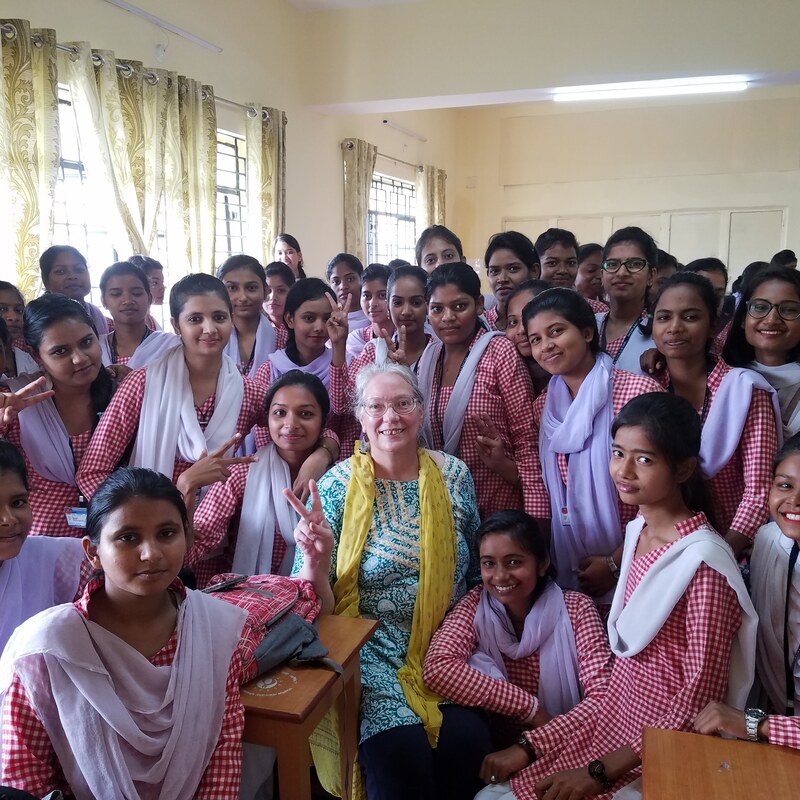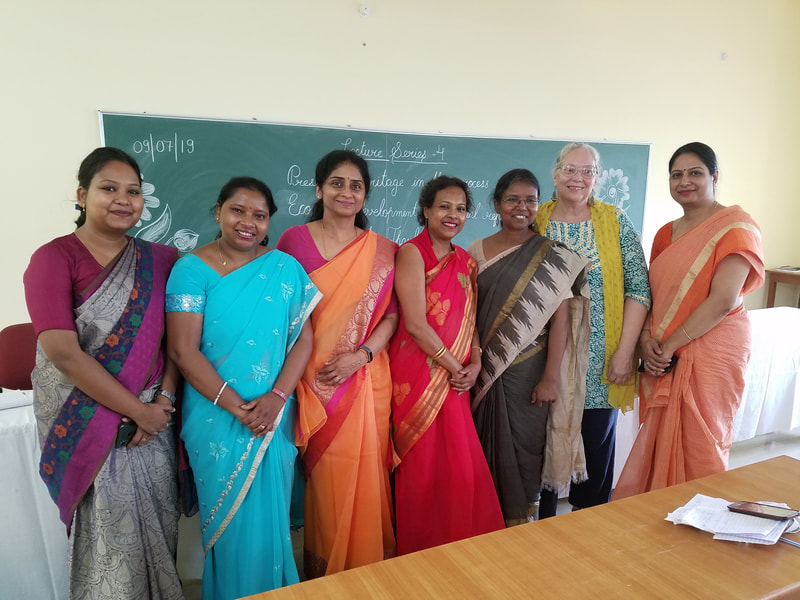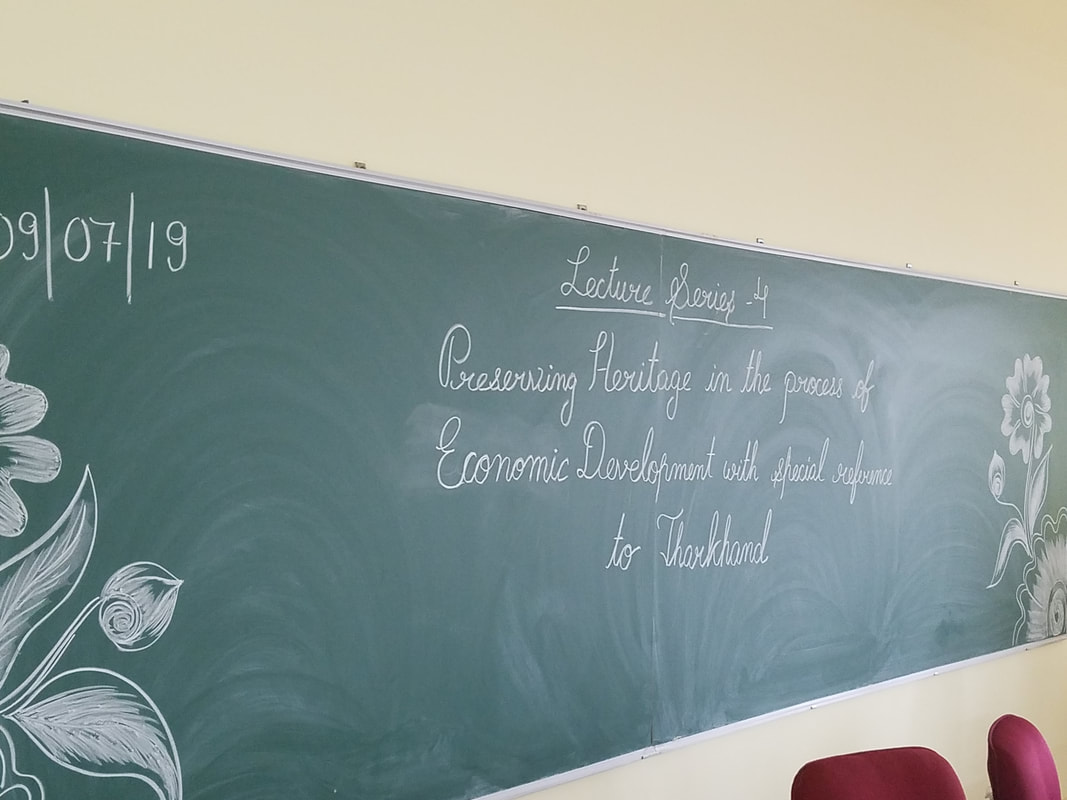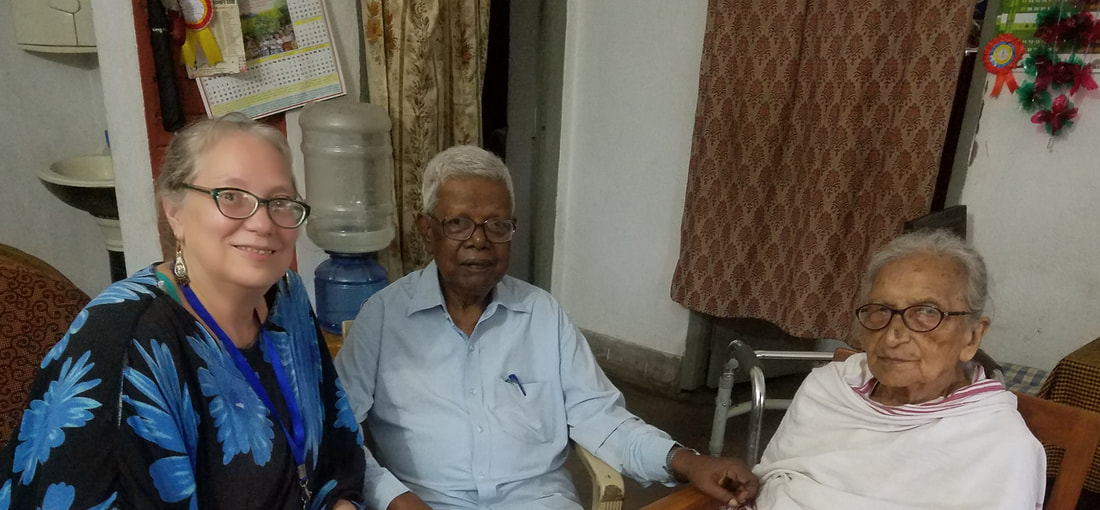|
What do I know of Economics? Evenso I was invited to speak at the girls Nirmala College in Ranchi, a Catholic College. Dr Nirmala Daisy Nilu Ekka who I met in 2016 has become a great friend. She is the head of the economics department and asked to present my book to her class and speak about economic development. Once again I had to speak spontaneously after figuring out what kind of audience i had and what the hopes of the economic teachers were. I had to speak quite simply in English, because though it is an English Medium school most of the students had a hard time following the English. The teachers also did some interpretations and explanations in Hindi.
I have written my book through the lens of history and psychology, but I had not really viewed what the missionaries of the 19th century did was community develooment. The fact that some of the students were there from tribal families, who recently were merely farmers or laborers. It is develioment that their children or grand children, especially girls, could now be going to school. Both the principal and head of the department encouraged the girls to aim high and take this opportunity to learn from the past. One thing I emphasised as I told of Ferdinand Hahn's life was that each one of them had something to offer from their experiences. Ferdinand Hahn did not have the chance to go to high school or college. He was completely self taught. As they soon found out, despite that, he was able to do many things that ended up positively impacting Jharkhand. He came to Ranchi in 1868 and was married in the Gossner Church on the main Road here in Ranchi. He came believing that the message of Jesus Christ was a liberating one and hoped to liberate the Adivasi from poverty and oppression. Education was the first important tool for development. His first job was to teach in the boys boarding school. Soon he was asked to help tutor the seminary students. Here was a man who had no seminary education who was able to teach others. Just as i was speaking to them about Economics, with very little training in Economics. So i can only speak from my experience and the experience of my great great grandfather. Then i mentioned he went to Chaibassa for a year. This was because there was an epedemic and many missionaries and their families died. It was discovered the well was contaminated so a new well was dug. I realised this to was part of economic develooment: clean water, food, housing, and education are key to any community's well being and development. After this he went to Lohardaga and there he spent much time learning about the culture and language of the Oraon tribe. He wrote down many of their folk tales and wrote the Kurukh Grammar that is still used today in Ranchi University or Gossner College where Kurukh is taught. In Lohardaga there were some members of the community who had contracted leprosy. Now in Oraon community they didnt outcast anyone who had leprosy, but the lepers themselves felt they were only a burden on the family. Now this was well before there was a cure The only way they could contribute to the family was to beg and they didnt want to do that. So here again there is another economic develooment example. A small community was built for them with their own talab and mango grove was planted so that the lepers could receive care for their wounds and have fruit to sell to help sustain Rather than criminalising or institutionalizing these poor sufferers he created a self supporting community. Because of his work with the lepers he was asked to go to Purulia to administer the lagest Asylum in all of Asia It was also at this time that he was asked to write about what he had learned about the culture. He was also asked to join Father Hoffman (Jesuit) to write the Chota Napur Tenancy Act. which recognized the traditional waysthe Adivasi identify their land. This important land reform was central to the survival and development of the Adivasi up to today. That law was passed in 1908. The missionary noticed that the people began to really improve their farns immediately afterwards. He asked why they hadnt taken such good care of their fields before? They replied that if they had the land would only be taken from them . So this reform empowered them to return to their ancient agricultural wisdom. I wanted to tell them of the role of Christianity in Economic Develooment In 1845 the first Lutheran mission came to Chota Nagpur (Jharkhand) their emphasis was to establish quality education. Father Lievens a Jesuit started a catholic church. His emphasis was to advocate for social justice the rights of the people. At the same time the Anglicans (now CNI) started a church. Now they of course were closely associated with the British, the ruling power at the time. So the Adivasi had this saying: if you want power, become an Anglican; if you want legal help become a Catholic; and if you want education go to the Gossner church. We know that times change and that now the Catholics are known for education, but that is how it was then. The point is the church played an important role in providing for the needs of the community. You may think only the government or business engage in economic development but churches and other NGOs play a very key role. Economic Develooment is important and vital for survival, but what was the problem with the British and still today , is that development often is done totally disregarding the people, their heritage and nature; this is short sited. Nature is destroyed, community is destroyed and in the end we all suffer So it is key to conduct economic development that keeps in mind the old wisdom, that gives voice to all sectors of society. to empower and to consider self-sustainability. Other values that were part of tribal economy were cooperation, reciprocity, community based equality, etc. These values must be re-ignited and incorporated in economic development.
0 Comments
Leave a Reply. |
Click here to learn more!
AuthorMary Girard with Bishop Nirmal Minz and his wife, Parakleeta, two remarkable leaders of the Adivasi Christians of Jharkhand. They are writer's themselves and have encouraged me much in my pursuit as a writer and have inspired many others. I am an author of my first book that is seeking publication. Among the Original Dwellers: Remembering Ferdinand Hahn, tells of the life story of my great great grandfather who was a missionary from 1868-1910 in Chota Nagpur. In writing his story I discovered the story of the Adivasi of the region who were also impacted by his life. I am now committed to inspiring others to learn and write about their Christian Adivasi heritage. Archives
April 2022
Categories |




 RSS Feed
RSS Feed